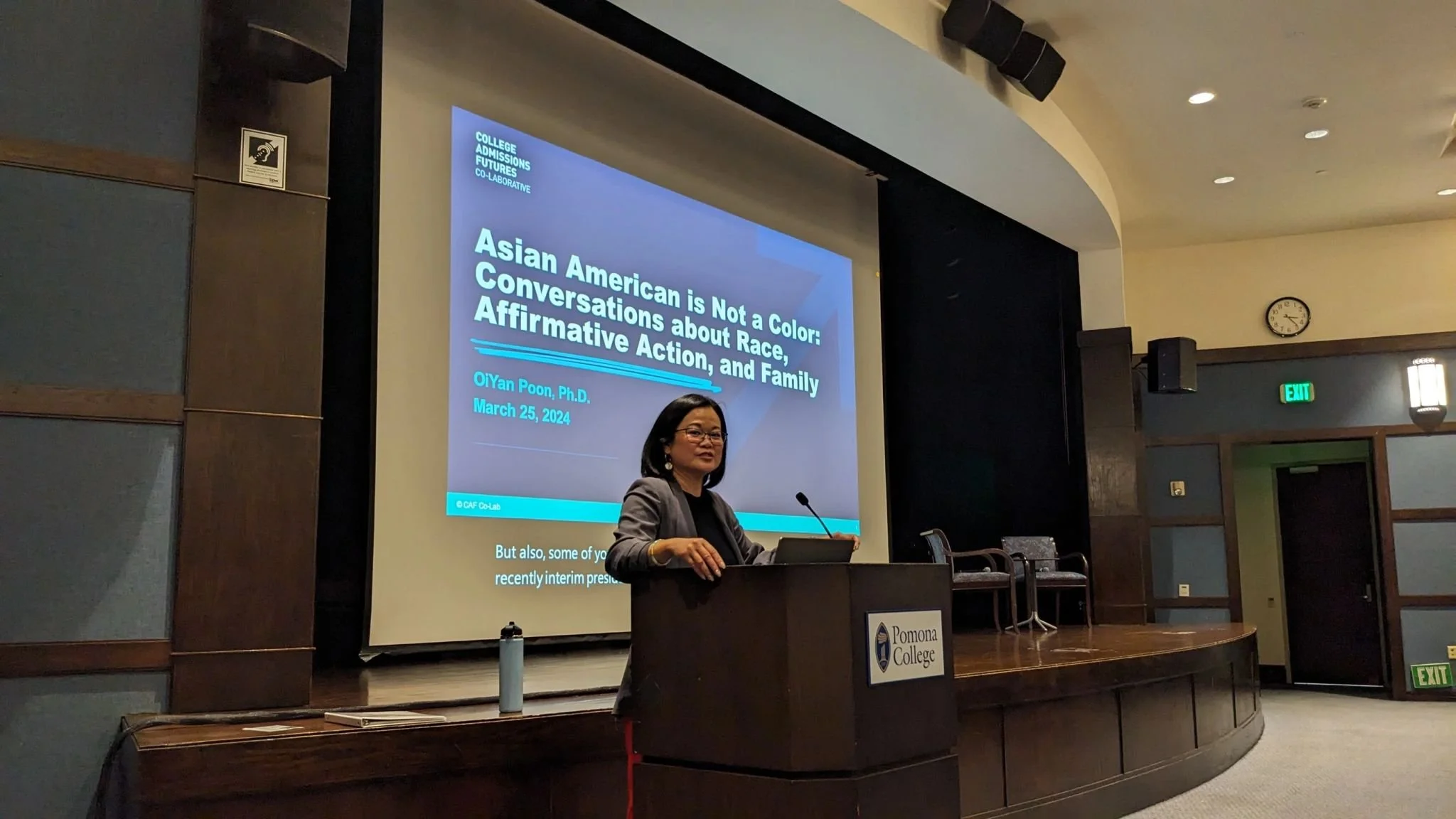Navigating the Future of Affirmative Action: Asian American Scholar OiYan Poon Highlights the Continued Relevance of Race in Education Policies
Asian American Is Not A Color Fall Book Tour Announced
Dr. OiYan Poon speaking at Pomona College (photo courtesy of Dr. OiYan Poon)
Chicago, IL — September 3, 2024 — OiYan Poon, a prominent educator and scholar in the field of race and education, continues a nationwide book tour this fall. The tour promotes her new book, Asian American Is Not a Color: Conversations on Race, Affirmative Action, and Family, published on April 30th, 2024. The book delves into the complexities of race, affirmative action, and their intersection with family and identity. Poon’s book offers timely insights into what institutions will look like after the Supreme Court's ruling ending race-conscious admissions, and how higher education might adjust to better serve a diversifying American population.
“The 2023 Supreme Court ruling against race-conscious admissions made it more challenging for colleges and universities–institutions that have long supported the growth of a healthy democracy–to serve an increasingly diverse population. However, leaders in higher education and other sectors can and must continue innovating toward their public service missions.” — Dr. OiYan Poon
After the one-year anniversary of the U.S. The Supreme Court’s landmark decision to strike down affirmative action, Poon’s book tour comes at a critical moment. The ruling has ignited widespread discussion about the future of race-conscious policies in higher education and beyond. MIT recently shared their enrollment stats for this fall (source NBC News), reporting a significant decrease in Black, Latino, Native American, and Native Hawaiian and Pacific Islander students, and a slight increase in White and Asian American students. As more schools share potentially conflicting enrollment stats, and with the upcoming presidential election further highlighting the role of race, ethnicity, gender, and class in public discourse, Poon’s voice is more essential than ever.
Dr. OiYan Poon on a panel at Bel Canto Books (photo courtesy of PapaLoDown Agency)
Public Tour Dates and Locations:
Yu & Me Books, New York, NY: September 18, 2024
Southern Connecticut State University, New Haven, CT: September 20, 2024
Possible Futures, New Haven, CT: September 21, 2024
Courageous Conversations Summit, Chicago, IL: October 8, 2024
Montclair State University, Montclair, NJ: October 17, 2024
UCLA, Los Angeles, CA: October 30, 2024
University of Maryland, College park, MD: November 12, 2024
Boston University, Boston, MA: November 19, 2024
Odyssey Books, South Hadley, MA: November 20, 2024
NCTE, Boston: November 22, 2024
In Asian American Is Not a Color, Dr. Poon challenges the notion that race can be neatly categorized or dismissed in discussions about affirmative action. Instead, she presents a nuanced narrative that underscores the importance of considering race in shaping equitable education policies. Her book is a compelling exploration of the lived experiences of Asian Americans and how these intersect with broader societal issues of race and identity.
Dr. Poon’s tour will feature readings from her book, followed by discussions on the current state of affirmative action and its implications for the future. Attendees will have the opportunity to engage with Dr. Poon on the pressing questions surrounding race and education, gaining insights from one of the leading voices in the field. For more information on the book tour and booking OiYan Poon for speaking engagements visit publicpedagogy.info
# # #
About Dr. OiYan Poon: Dr. OiYan Poon is an acclaimed scholar, educator, and advocate for racial justice in education. Her work focuses on the intersections of race, education, and policy, with a particular emphasis on Asian American experiences. Dr. Poon has been a vocal proponent of affirmative action and has published extensively on the subject, contributing to national conversations about race and equity in education. For more information visit publicpedagogy.info


